
by Jason Joyner | Oct 29, 2019 | Blog, fiction, writing craft
Hey gang, I’m trilled to have JPC Allen sharing a guest post here today. She writes about how to beat a tight deadline. Check it out, and don’t miss the link for the giveaway at the end of her post.
________________
Last December, I was faced with creating a 5,000-word short story that actually made sense in two weeks. While I got ready for Christmas, taught Sunday School, and prepared for a visit from my in-laws. And I don’t write fast. It took me years to get my YA crime novel in shape.
But I decided to go for it. I met the deadline, got accepted, and my YA mystery, “A Rose from the Ashes”, was published in Christmas fiction off the beaten path on October 1.
If you face a tight deadline, the lessons I learned may help you.
- Know your ending before you start.
I wasted one whole day because I wasn’t sure what the theme of my story was. I wrote fourteen pages that were pretty much worthless. Once I knew the theme and how it would end, I directed all my efforts to reaching that conclusion. If my writing seemed to be veering away off course, knowing where I needed to end up got me back on track.
- Write a synopsis.
“A Rose from the Ashes” is about nineteen-year-old Rae Riley investigating who tried to kill her pregnant mother twenty years before and if the attacker is the father she’s never met. Because my mystery hinges on a twenty-year-old cold case, I wrote out exactly what happened, like book report. Then I could keep straight what Rae knew and what she had to discover.
- Tell your story to someone.
After I’d wasted a day, I sat down with my husband and told him my story. I am blessed to be married to an engineer. He looks at my plots logically, which is so important when writing a mystery. He was able to tell me what made sense and what I needed to work on.
- Write the basic story.
My first draft was getting down on paper the bare bones of the story. If inspiration hit for a description, I threw that in, but the point wasn’t to write well. I just wanted to write the story from beginning to end and see how it hung together.
- Rewrite with description
After I got down the basic story with the basic plot, I rewrote it with the idea of adding descriptions, both for characters and settings. I did this several times because each time I read through the story, I saw places that needed fleshing out.
- Ask readers, not writers, to read your story
Writers read a story differently than non-writers. Writers usually read with their professional hats on. Readers read simply to enjoy the story. I have a good friend and several relatives who love mysteries. I asked them to read my story for things that didn’t make sense or made them pause. Two of my sisters read a description that they took for an insult. That wasn’t my intent at all and completely changed the nature of a character. So I changed the description.
- Get a handle on your main character.
This should probably be #4, but I didn’t get around to it until late in the process. I wrote the story in first person. My mind was so deeply rooted into my main character that I didn’t realize I wasn’t putting all those thoughts and feelings on the page. After several drafts, I realized Rae was the sketchiest of all the major characters. I needed to get a handle on her, a way to sum her up. I enjoy photography and thought amateur photographer was a good way to describe Rae. It covered how she responded to settings and saw the people around her.
Have you faced a tight deadline? What lessons did you learn?
I’m holding a book giveaway on my site! Click here for details.
BIO

JPC Allen started her writing career in second grade with an homage to Scooby Doo. She’s been tracking down mysteries ever since. A former children’s librarian, she is a member of ACFW and has written mystery short stories for Mt. Zion Ridge Press. Online, she offers writing tips and prompts to beginning writers. She also leads writing workshops for tweens, teens, and adults, encouraging them to discover the adventure of writing. A lifelong Buckeye, she has deep roots in the Mountain State. Join the adventure on her blog, Facebook, Instagram, or Goodreads.
Book Blurb
Christmas fiction off the beaten path
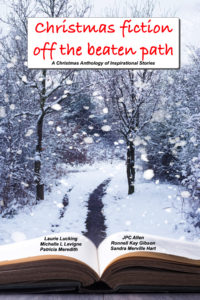
Not your Granny’s Christmas stories …
Step off the beaten path and enjoy six stories that look beyond the expected, the traditional, the tried-and-true.
Inspired by the song, “Mary Did You Know?” – a mother’s memories of events leading up to and following that one holy night. MARY DID YOU KNOW? By Patricia Meredith
A young woman seeking her own identity searches for the man who tried to kill her and her mother on Christmas Eve twenty years before. A ROSE FROM THE ASHES. By JPC Allen
Princess, tower, sorceress, dragon, brave knight, clever peasant – combine these ingredients into a Christmas-time story that isn’t quite what you’d expect. RETURN TO CALLIDORA. By Laurie Lucking
Anticipating tough financial times, the decision not to buy or exchanged presents leads to some painful and surprising revelations for a hardworking man and his family. NOT THIS YEAR. Sandra Merville Hart
Years ago, a gunman and a store full of hostages learned some important lessons about faith and pain and what really matters in life – and the echoes from that day continued to the present. THOSE WHO STAYED. By Ronnell Kay Gibson
A community of refugees, a brutal winter, a doorway to another world – a touch of magic creating holiday joy for others leads to a Christmas wish fulfilled. CRYSTAL CHRISTMAS. By Michelle L. Levigne
BUY LINKS
Amazon, Barnes and Noble, 24Symbols, Kobo

by Jason Joyner | Jan 22, 2014 | Blog, CSFF, dystopian, Jill Williamson, Outcasts, speculative fiction, writing craft, young adult
Hey-o boys and femmes.
I’ve talked about Jill Williamson and her cool series The Safe Lands, and our feature book Outcasts, book 2 in the series. My recap of the first book Captives is here, and my review of Outcasts is here.
The series is geared for Young Adult audiences. It also falls under the category of dystopian fiction, which is all the rage right now. Think The Hunger Games, Divergent, and Steelheart as recent stories that fit the genre.
So what is dystopian fiction?
If utopia is the term for a perfect place, then dystopia is the opposite. Dystopian stories take place in a setting where something has gone wrong. Either society has broken down and there is chaos, or there is a controlling factor which rules society in a dysfunctional way.
Even though it has become popular lately, it has been around for a while. Classic books like 1984 or Brave New World are dystopian. It’s the opposite of the idea behind Star Trek, where humanity progresses to higher standards and behavior. Instead, things get worse. It relates to fears that humanity is going to mess things up. Maybe we ruin the planet, or a yet undiscovered virus will wipe out a majority of the population, or we turn to dictatorships for control. Somehow, things are going to go bad.
Some may ask, “Why is this a genre for Christians to write about? Don’t we have a future hope? Aren’t things going to get better?”
Valid questions, but I would argue that it is precisely the Christian who needs to be speaking into this genre. A lot of writers in this have a pessimistic view of the future. Christians can provide the hope and light needed to balance things out. With the caveat that it can’t be preachy.
Consider the Garden of Eden. This could be considered the first dystopian story. Adam and Eve lose fellowship with their Creator over their sin, and now they live in a harsh world. Noah is very much in this vein as well.
How about some of the stories in Judges?
Would the Israelites raised on stories of King David think that exile and being ruled by Persia, Greece, and Rome would qualify as dystopian?
Christians have survived the fall of the Roman Empire. Our faith has survived centuries of conflict in Europe and around the world.
Finally, what about the Apocalypse? No matter your interpretation of the Book of Revelation, it is clear that the story reflects a dystopian time that is overcome by the Prince of Peace at the last.
Christians can truthfully write about a future where things have broken down in some way because we recognize that we live in that now. The world is not as it should be, and a ragamuffin group of rebels against the status quo is running around claiming a man rose from the dead and can bring living water.
A series like the Safe Lands just amplifies it for dramatic effect. The cool thing is that Jill does it without the preachy aspect. It will make teens think, seeing examples of good and bad, without pointing to a character and saying, “See that? That is what is bad for you. So stay away from the bad.”
It’s what I love about speculative fiction. The “what if” questions that you can ask when you suspend reality, whether through fantasy, science fiction, steampunk, cyberpunk, time travel, or plain old dystopian. So for Jill and other writers venturing into such places, go for it. It’s awesome.
If you want to see some more feedback about Outcasts, then Becky Miller has a list of all of the participants and their posts.
What do you think? Is there something about the dystopian genre that we should be wary of as Christians, or are there ways to work redemptively through it? Share below.
—
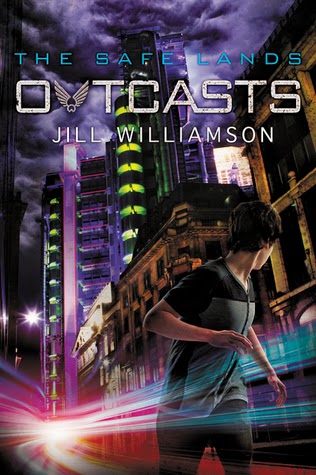
by Jason Joyner | Jan 20, 2014 | Blog, CSFF, dystopian, Jill Williamson, speculative fiction, writing craft, young adult
Hey-o boys and femmes. Welcome back to the Christian Sci-fi and Fantasy blog tour, where the best in Christian speculative fiction is highlighted.
 This month we’re featuring the book Outcasts by Jill Williamson. It is the second book in the Safe Lands series.
This month we’re featuring the book Outcasts by Jill Williamson. It is the second book in the Safe Lands series.
In the first book, Captives, we learn about a post-pandemic America. The Safe Lands is a walled city that has survived and has developed its own culture and lives by the philosophy of “find pleasure in life.” The problem is that they can only control the thin plague – they can’t cure it. And it is making their women sterile.
Glenrock is a village that exists outside the Safe Lands and lives in a much more rural existence. The villagers have a patriarchal society, continue to fellowship with God, and do things on a natural level.
When leaders from the Safe Lands decide to ask Glenrock to join them to help with their fertility issue, they assumed the villagers would want to join for the benefits of technology. But the plan goes awry and many villagers are killed.
Three brothers, sons of Papa Eli, must make their way in the Safe Lands. Eldest Levi has the mantle of village elder and wants to rescue his people from their clutches.
Mason was trained as a healer in the village, and now is placed in the medical system of the Safe Lands and looks for a way to not only save his people, but stop the thin plague as well.
Omar, the youngest, delivered his people to the Safe Lands in exchange for power and prestige, things he couldn’t accomplish on his own in the village. However, his acceptance of Safe Land life will come with a cost.
Captives starts an intriguing young adult trilogy with adventure and thought-provoking commentary on our modern life. I’ll talk about Outcasts in a later post.
For more information, you can check out my prior posts on Captives. The folks below will be discussing Outcasts during the tour as well, and Becky Miller is our tour master and will update with all the latest.
Red Bissell
Thomas Fletcher Booher
Beckie Burnham
Pauline Creeden
April Erwin
Victor Gentile
Ryan Heart
Timothy Hicks
Julie Bihn
Carol Keen
Shannon McDermott
Meagan @ Blooming with Books
Melanie @ Christian Bookshelf Reviews
Rebecca LuElla Miller
Joan Nienhuis
Nissa
Jalynn Patterson
Writer Rani
Chawna Schroeder
Jacque Stengl
Jojo Sutis
Steve Trower
Phyllis Wheeler
Deborah Wilson
—
Legal mumbo-jumbo: In conjunction with the CSFF Blog Tour, I received a free copy of this book from the publisher.
—-
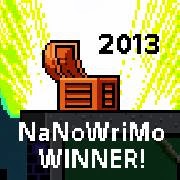
by Jason Joyner | Dec 11, 2013 | Blog, NaNoWriMo, writing, writing craft, Writing Wednesday
 |
| Lookit what I won. |
In 2011 I wrote a post entitled, “Why I Don’t Do NaNo.”
NaNoWriMo, to the uninitiated, is the National Novel Writing Month. Each November writers are encouraged to plant the butt firmly in chair and crank out a 50,000 word novel. It’s been going on for several years now, and it always brings out a lot of excitement in writer circles.
In 2011 I talked about how it didn’t work for me when I tried it a couple of times. It was good for some people, but didn’t work for everyone, and I was one of those writers.
Fast forward to 2013.
Facebook was buzzing with my writer friends saying how they were going to disappear for the month because of NaNo. The excitement was palpable. Just because I said I wasn’t going to do it, I felt a pang of missing out.
Man, they were going to have all this fun.
Then on October 30, I thought, why not? I can try it again. If I get a few thousand words out, it’s more than I would have had if I weren’t writing. My main project was under going another round of revisions, so it was out of consideration.
But there was this new idea I’d been composting for a while. I even got to do some brainstorming on it with Jill Williamson on our flight back from the ACFW writer’s conference in September. Would the new idea hold water? NaNo seemed like an opportunity to play with it and see what could happen.
I jumped in.
For the first week, I kept up pace. A writer has to average 1667 words a day to finish the 50,000 on time. Then life started interfering and I fell off. Well, at least I had some words down.
Except I had a taste of success. Circumstances worked out. I kept plugging away.
By November 28 I had three days left and 10,000 words to go. Could I do it? Facebook friends were now cheering me on. My wife succumbed agreed to let me have time over the holiday weekend to hit the keys.
And on November 30 I clocked in at 50,077 words.
So, this is partially a self-indulgent, congratulatory post. Whoo-hoo, I did it!
But I also learned some things about writing.
I learned how to push for a deadline. My first novel was written over seven years. No sense of urgency there. Now I knew I could be dedicated and churn out some significant production if challenged.
I was able to explore a new idea. Obviously the first draft of everything is mostly crap, but it forced me to work through some plot points, and there are a few keepers in there. Of course, the chapter where I was stuck and decided to interview one of my characters for “word count” won’t make the final cut. But I learned things about Demarcus that I can use later on. It’s all good!
Having a minimal outline helps. I was drowning for a bit until I brainstormed a few plot points to get me out of a bunch of conversations over food. Even when one of the points was, “something bad happens now,” it helped me have enough structure to push forward.
I went from doing 1000 words on my best day to 5200 words. Again, they came fast and furious, and I hope they at least make complete sentences, but I got them out. Now the revision scalpel can come out.
So to me in 2011 – you were wrong. You can do NaNo, and with the right circumstances it does help you out. But enough of the blog post – you’ve got revision to do. Get cracking!
—
Have you done NaNo? What was your experience? Please share in the comments below.
—
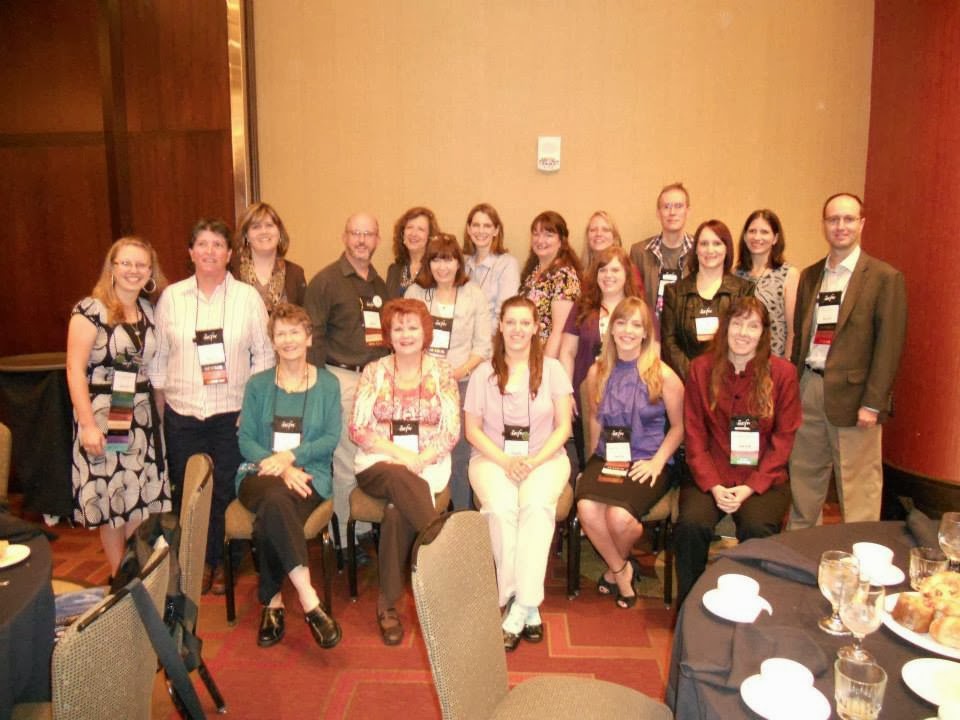
by Jason Joyner | Sep 26, 2013 | ACFW, Blog, conference, writing craft, Writing Wednesday
That was fast.
The 2013 ACFW Conference in Indianapolis has come and gone like a blur. It seems only a few days ago I was talking about the 2012 conference in Dallas. Sheesh.
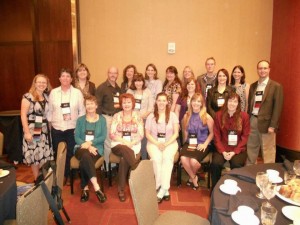 |
| The Northwest writers. |
You might wonder what happens when 580+ writer types gather in one place like that. Being a guy who likes speculative fiction, I could say that it tears into the space/time continuum, but that might be a little exaggeration.
If you are serious about writing, going to a conference is a great thing to do. You are around other creative types that understand the process, the joys and battles of it all. There are great opportunities to learn the craft and meet people to encourage and help you along the way.
For those who have gone to ACFW and couldn’t make it this year, you were missed. The conference filled up due to a lower capacity at this hotel. It was nicer than Dallas in that we were downtown, so it was possible to get out and about.
I’m proud to belong to a group like ACFW because of the fellowship in Christ we also share. It isn’t every conference where you find a couple of writers huddled in a corner discussing plots or future plans and then bowing heads to pray about the things shared. That is a special part of ACFW that is a real benefit to Christian writers.
I have some friends that want more details. Here’s a running list, and feel free to contact me if you have questions about anything here.
*I didn’t know much about Robin Jones Gunn, the keynote speaker, but she was a joy and such an encouragement. She spoke like a true storyteller and helped put things in perspective for all of us. I think she was exactly the person needed there.
*If you can go to a James Scott Bell lecture or workshop, do it. There’s a reason he is spoken of so highly in writer circles for the craft. He presents so well and lays out the tricks and tips he’s learned in such an entertaining and helpful way. I’ve read his book Plot & Structure, but this brought it home even more. The only downside is that it was a full-day workshop, so I had to miss out on some other interesting possibilities.
*I need therapy now thanks to Tosca Lee. She presented a class on making unsympathetic characters sympathetic. She had us write about betrayals, loss, fears. I thought I had dealt with those issues, but she dredged them all up. Actually, this was quite helpful in making my bad guy better.
*Storytelling games with speculative fiction writers beats all. Just sayin’.
*Leave it to Peter Leavell to get one hooked up with the cool crowd.
*The costume night was a big hit and a very smart, diplomatic move by the conference organizers. No one got kicked out this year! Good job Robin and company.
*Pitching to agents and editors was much easier the second time around. Though I still wish I would have brought chocolate as a bribe. Just in case.
*I would like to see some way to gather and encourage the men at ACFW. We are outnumbered by far and I think it would be a boost to have some fellowship in some way.
*There is still a lot of talk about traditional publishing vs. small press vs. self-publishing electronically. The issue is big and is still in a lot of flux. Check out Rachelle Gardner’s ebook for the same content she shared in a class there.
*There are a lot of creative people out there who love the Lord. I pray we all look to see how best we can serve Him and others with our gifts. Perhaps some of us should be broader in scope – finding ways to reach out to the general market or provide quality stories with heart that prepares the way for their readers to be more open to the spiritual.
*The elevators were a great place to meet and greet. Sometimes we got really close on the elevators. Seeing as there were only four and the stairs weren’t handy.
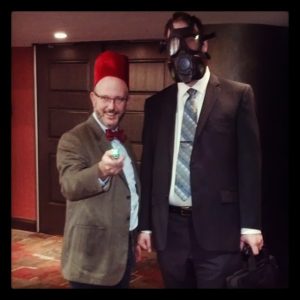 |
| “Are you my mummy?” |
It was a great time, and despite some last minute doubts, this conference turned out better than last year for me at least.
And yes, I’m wearing a fez. Fezzes are cool. (Bonus points for the reference there).

by Jason Joyner | Aug 28, 2013 | Blog, rules schmules, writing craft, writing rules, Writing Wednesday

As an aspiring writer, there are rules of fiction that I must live by. Show, don’t tell. Stick with one point of view a chapter. Don’t use passive voice. Kill all your adverbs.
All of these rules are very helpful for writers. They become rules because they do help books sound better. They help a writer.
However, there’s a backlash going on in the writing world. People are starting to ask question about the rules.
Jeff Gerke is a writing teacher, author, and publisher. On Facebook,
he started a discussion about the writing rules out there because he wants to write a book about the rules. In his book
Write Your Novel in a Month he argues that the only rule that can’t be broken is to be sure to engage the reader.
Finally, Rachelle Gardner, a respected agent with one of the top writing blogs, just talked about the rules being tools overall. They can help when a book isn’t working, but if it works to break a rule for the situation, then it’s okay.
This has helped me a lot. I know that I need to listen to advice from those who have experience. But I’ve also gotten conflicting advice. I got knocked off my groove for a couple of months after some bad feedback from a writing contest. Now I’m getting back into it and I’m realizing that I need to serve the story overall and use the rules as those tools, not as a bludgeoning hammer to force something into place.
I’m thankful for these people speaking up about the rules being more, well, guidelines to steal from a certain pirate captain. Hopefully my writing friends can be encouraged in the same way.
SO: any writing rules you’ve run across that have been used against your writing that really needed to be broken? Share them here and I’ll pass them on to Jeff Gerke for his book.
—
P.S. Did anyone notice the writing rule I broke in the first sentence?
—
P.S.S. Can you believe I’ve finally gotten a Writing Wednesday post out?
—










